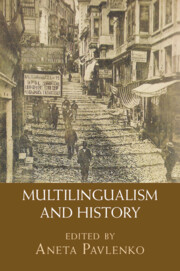Book contents
- Multilingualism and History
- Multilingualism and History
- Copyright page
- Contents
- Figures
- Contributors
- Acknowledgments
- 1 Multilingualism and Historical Amnesia: An Introduction
- 2 Greek Meets Egyptian at the Temple Gate: Bilingual Papyri from Hellenistic and Roman Egypt (Third Century BCE–Fourth Century CE)
- 3 Language Shift, Attitudes and Management in the Roman West
- 4 Languages at War: Military Interpreters in Antiquity and the Modern World
- 5 How Multilingualism Came to Be Ignored in the History of Standard English
- 6 Multilingualism and the Attitude toward French in the Latin Kingdom of Jerusalem
- 7 Why Colonial Dutch Failed to Become a Global Lingua Franca
- 8 How Unique Was Russia’s Multilingual Elite?
- 9 Language Ideology and Observation: Nineteenth-Century Scholars in Northwestern Siberia
- 10 Studying Historical Multilingualism in Everyday Life: The Case of the Habsburg Monarchy in the Nineteenth Century
- 11 Multilingualism and the End of the Ottoman Empire: Language, Script, and the Quest for the ‘Modern’
- 12 “Multilingualism Is Now a Must”: Discourses on Languages and International Cooperation at the Council of Europe
- 13 The Role of the Past in Language Revitalization
- 14 Historic Reenactments in Contemporary Spain: Fiestas de moros y cristianos
- 15 Multilingual Ghost Signs: Dissonant Languages in the Landscape of Memory
- Index
- References
12 - “Multilingualism Is Now a Must”: Discourses on Languages and International Cooperation at the Council of Europe
Published online by Cambridge University Press: 20 April 2023
- Multilingualism and History
- Multilingualism and History
- Copyright page
- Contents
- Figures
- Contributors
- Acknowledgments
- 1 Multilingualism and Historical Amnesia: An Introduction
- 2 Greek Meets Egyptian at the Temple Gate: Bilingual Papyri from Hellenistic and Roman Egypt (Third Century BCE–Fourth Century CE)
- 3 Language Shift, Attitudes and Management in the Roman West
- 4 Languages at War: Military Interpreters in Antiquity and the Modern World
- 5 How Multilingualism Came to Be Ignored in the History of Standard English
- 6 Multilingualism and the Attitude toward French in the Latin Kingdom of Jerusalem
- 7 Why Colonial Dutch Failed to Become a Global Lingua Franca
- 8 How Unique Was Russia’s Multilingual Elite?
- 9 Language Ideology and Observation: Nineteenth-Century Scholars in Northwestern Siberia
- 10 Studying Historical Multilingualism in Everyday Life: The Case of the Habsburg Monarchy in the Nineteenth Century
- 11 Multilingualism and the End of the Ottoman Empire: Language, Script, and the Quest for the ‘Modern’
- 12 “Multilingualism Is Now a Must”: Discourses on Languages and International Cooperation at the Council of Europe
- 13 The Role of the Past in Language Revitalization
- 14 Historic Reenactments in Contemporary Spain: Fiestas de moros y cristianos
- 15 Multilingual Ghost Signs: Dissonant Languages in the Landscape of Memory
- Index
- References
Summary
The purpose of this chapter is to examine the discourses of multilingualism in the Council of Europe. More specifically, it is a study of language categories used by nation-state representatives in a debate held in the Council of Europe’s Parliamentary Assembly in 2001. I am particularly interested in how language categories are used to form language power blocs, i.e., alliances of nation-states that pursue their linguistic and cultural agendas on the international political scene. The analysis is based on a critical approach that considers the layers of historicity in which a specific discourse is embedded and to which it refers. The findings suggest that debates on the place of languages in the European curricula function as a proxy for negotiating the status and legitimacy of a nation-state on the international level. Language debates, in other words, serve as a terrain for mediating and managing Europe as a political and a geographical entity.
Keywords
- Type
- Chapter
- Information
- Multilingualism and History , pp. 223 - 238Publisher: Cambridge University PressPrint publication year: 2023
References
- 3
- Cited by

